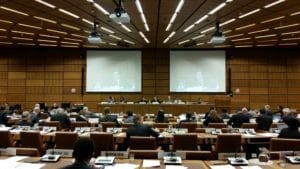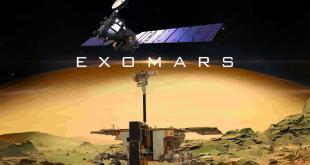
After the signature of eight countries to the Artemis Accords, the position of the European Space Agency ESA was discussed a lot. SpaceWatch.Global Editor-in-Chief Markus Payer used the opportunity to talk with Prof. Dr. Kai-Uwe Schrogl is Vice Chair of the European Coordination Committee for the ISS Intergovernmental Agreement (IGA-CC)
Markus Payer: There have been pretty critical notes and comments from German and European side, but also from the Russians regarding Artemis. Artemis is too U.S. centric, they basically said. Given the new ESA-NASA-Moon arrangements, is this now obsolete and out of the way?
Kai-Uwe Schrogl: Criticism on the Artemis Accords varies considerably. When European countries deliberate on them, it is on the background that the US is a traditional partner in space science and exploration, with whom we are bound by a long-standing mutually beneficial cooperation and partnership. Just look at the most recent example of SOFIA, the US-German observatory, making the exciting discovery of widespread hydration on the lunar surface. This does not prevent us from expressing our views and positions. But this is done in a constructive way and in a dialogue amongst partners.
It seems that ESA chose well in signing up with concrete Artemis contributions which benefit the European space sector. But will Europe also sign the entire Artemis Accords?
The Member States in ESA were keen to establish a partnership with the US in Artemis/Gateway at the last ESA Council at Ministerial level in 2019. In this new cooperative venture, there will be even more ESA Member States participating than in the ISS cooperation. So, the interest is growing and Germany, who is the lead in this field, takes care that we also find the right governance mechanisms. This was demonstrated, when the European Coordination Committee for the ISS Intergovernmental Agreement (IGA-CC) this spring found a compromise with the US State Department and NASA to establish a legal basis for ESA’s participation in Artemis/Gateway without simply extending the ISS-Intergovernmental Agreement, which would have been easy but not appropriate for European partnering States‘ governments and parliaments. We will therefore negotiate a new agreement with the US which is tailor-made for our participation in Artemis/Gateway. The Artemis Accords may be considered in this process as an input.
Have the EU countries which signed Artemis (like Italy, Luxembourg, and also the departing UK) not outed themselves in the concert of the ESA members, making it basically impossible for ESA or EU to carve out and sign a common deal with Artemis?
We should not dramatize what is currently happening. We have to understand what the US is proposing. The Artemis Accords are, according to the many communications we see, a non-binding policy document. The US has selected a few European countries, with which they have specific bilateral cooperation, so it was particularly easy to find followers for the promotion of its policy. We also have to understand that it is not about changing the Artemis Accords. They are a position expressed. It will be crucial to find common ground on the governance for the exploration of the Moon and other celestial bodies based on international law. Neither ESA nor the EU nor any European State is pressed to formally join and sign the Artemis Accords. This is, why we will have good opportunities to coordinate in Europe, for which an adapted IGA-CC, complemented with the States who now participate in the European contribution to Artemis/Gateway, is the appropriate forum, since it comprises the governments of these States.
What are the points in the Accords that Europe sees critical or even regards as unacceptable? And how would the U.S. or all eight signatories ever be able to change and heal that?
When I shared the view on the status of the Artemis Accords and tried to de-dramatize the current debate, it becomes apparent that it is not about changing the present text or desperately trying to become signatory to it. We regard it as what it is, a proposal for the multilateral debate of governance. We must not overrate it. First of all, we have to acknowledge and appreciate that the US promotes the rule of law in outer space. This is not a trivial fact, since we see quite different signals and actions from many countries around the world regarding the rule of law in many other areas. With the Artemis Accords, the US intends to present their approach to implementing four outer space treaties. It is aware that this cannot constitute an authoritative interpretation of these treaties and it cannot constitute a new universal international space law either. Concretely, we will have to discuss with the US the issues of non-appropriation and freedom of use, which might be affected by specific provisions in the text. We should also avoid that we stumble into a discussion on security aspects, which will be detrimental to peaceful exploration. In general, we have to find a right balance for an equitable distribution of the benefits from exploration and exploitation, for which the Moon Agreement was adopted unanimously by the UN General Assembly to be an enabler but unfortunately was not put in a position to take this role until now. We should also continue to learn from the governance of the other global commons as Antarctica and the High Seas and the Deep Seabed.
Where do you see the Artemis talks with Japan, Russia, China or India going? Is Europe, as a bridging ambassador and diplomacy champion, involved?
The way how the US is presenting its position on the governance of exploration is obviously raising concern by many countries. From my experience in UNCOPUOS, we might also have expected that the US presents a working paper, co-signed by others, to the ongoing discussions in the Legal Subcommittee. However, it chose a way that is not understood by numerous delegations, since such a high-level political position might intimidate some but incite others even more. We have to balance on the multilateral level the existing fears about first-come-first-served approaches or about conflicts resulting from exclusion. It is also not a good signal regarding the acceptance of a multilateral discussion embracing consensual results. The US insists that the Artemis Accords are, nevertheless, meant as such a contribution to the debate in UNCOPUOS, but it is not appreciated as particularly diplomatic. The European States first have to consolidate their position before starting to bridge conflicting positions. In the meantime, single European States which are not yet committed can take a role in sounding out the waters.

Kai-Uwe Schrogl is the Vice Chair of the European Coordination Committee for the ISS Intergovernmental Agreement (IGA-CC) and was the Chair of the UNCOPUOS Legal Subcommittee from 2014 to 2016.





